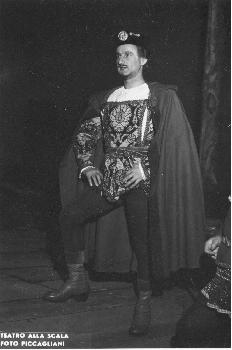A member of the Italian minority in Istria and hence an Austrian-Hungarian citizen, he was born in Hungary where his father
served by chance in the army during World War I. The actual residence of his family was in Fažana, where he grew up and
became a fisherman, doubling as a baker's assistant by night since his family was so poor they needed every dime. Since he sang
so well, the villagers nicknamed him "goldfinch" ("cardellino" in Italian, hence also a play on his name Carlin), and often
encouraged him to become a professional singer.
When one of his sisters married to Milano, he took the opportunity to join her, working by day and studying voice in the
evening. He had just been accepted into the choir of La Scala when World War II broke out, and he had to serve in his native
Istria (then part of Italy). He managed to take further voice lessons in Pula and Trieste beside military service, and in July
1945, he finally made his debut with two concerts in the antique amphitheater of Pula, and got a contract as a radio tenor in
Trieste.
In 1947, he made his debut at La Scala as Cassio, where he would have a 30-year career as a highly-esteemed comprimario. As a
guest, either with the Scala troupe or on his own, he appeared at La Fenice in Venice, at the San Carlo in Naples, the Arena di
Verona,the Maggio Musicale in Florence, in Rome, Trieste, Parma, Palermo, Spoleto, Bologna; and abroad, at the Wexford,
Glyndebourne and Bregenz festivals, in Rio de Janeiro, Amsterdam, Geneva, Tel Aviv or at the Vienna Staatsoper. With the
Milano-based Collegium Angelicum, he also sang a lot of Baroque music.
Reference 1, reference 2: Kutsch & Riemens
